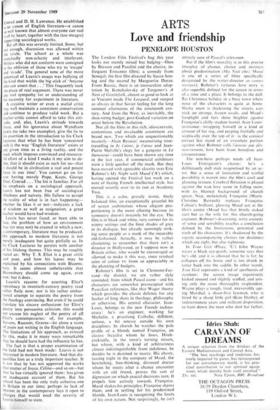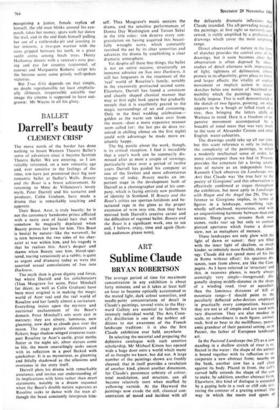ARTS Love and friendship
PENELOPE HOUSTON
The London Film Festival's bag this year looks not merely mixed but bulging—films by Bresson and Pasolini and the elusive, in- frequent Ermanno Olmi; a comedy from Senegal; the first film directed by Susan Son- tag and the second by Marguerite Duras. From Russia, there is an immaculate adap- tation by Konchalovsky of Turgenev's A Nest of Gentlefolk, almost as good to look at as Visconti made The Leopard, and steeped as always in that Soviet feeling for the long summer afternoons of the nineteenth cen- tury. And from the West, as inevitably, the shoe-string budget, post-Godard variation on angst before the Revolution.
Not all the films in this rich, idiosyncratic, contentious and invaluable assortment are brand new. Two which are unquestionably masterly—Alain Resnais' mesmerising time- travelling in le raime, fe raime and Jean- Pierre Melville's elegy for a gangster in Le Samourai—could have been shown any time in the last year, if commercial exhibitors were a little quicker off the mark. But they have moved with agreeable alacrity over Eric Rohmer's My Night with Maud ('A') which, having opened the Festival last week on a note of fizzing French intellectual style, has moved smartly over to its run at Academy Two.
This is a calm, gravely ironic, finely balanced film, an exceptionally graceful bit of screen architecture whose elegant pro- portioning is the more alluring because its symmetry doesn't instantly hit the eye. The film is in black and white, very correct for its wintry settings and the finer shades of grey in its dialogue, but already seemingly strik- ing some people as a mark of the incurably old-fashioned. Actually, it may be rather chastening to remember that there isn't a director in Hollywood, or I suppose now in Britain either, who would be encouraged or allowed to make it this way, since residual sales of colour TV loom so appreciably in the planning of budgets.
Rohmer's film is set in Clermont-Fer- rand—the district, we are rather slyly reminded, from which Pascal came—and his characters are somewhat preoccupied with Pascalian references, like that Wager theory which provides the classic defence for any backer of Long shots in theology, philosophy or otherwise. His central character, Jean- Louis, belongs to the new French techno- cracy: he's an engineer, working for Michelin, a practising Catholic, diffident, serious, a bit uneasy outside his own disciplines. In church he watches the pale profile of a blonde named Francoise, an elusive bicyclist whom he loses, Hitch- cockianly, in the town's turtling streets, but whom, with a kind of arbitrariness almost indistinguishable from indolence, he decides he is destined to marry. His chaste, teasing night in the company of Maud, the bewitching, free-thinking, divorced doctor whom he meets after a chance encounter with an old friend, proves the sort of digression on which crucial decisions turn. It propels him actively towards Francoise. Maud shakes-his principles; Francoise shares them; and in settling for his predestined blonde, Jean-Louis is recognising the limits of his own nature. Not surprisingly, he isn't entirely sure of Pascal's relevance.
But if the film's morality is in this precise interplay of chance, choice and instincts about predestination (Ma Nuit chez Maud is one of a series of films specifically designated by the writer-director as conies moraux), Rohmer's virtuous love story is also superbly defined for the screen in terms of a time and a place. It belongs to the dull. flat Christmas holiday in a busy town where none of the characters is quite at home. Slushy snow is thickening the streets, cars stick on strange, frozen roads, and Maud's lamplight and furs shine brighter against Francoise's chilly student hostel. Jean-Louis' resistance—wrapping himself in a kind of armour of fur rug, and peeping fretfully and sceptically over the top of it—is the comical correct last stand of an irresolute puritan against what Rohmer calls l'amour par des- oeurrement, love born from boredom and circumstance.
The non-hero perhaps needs all Jean- Louis Trintignant's charm : he's a deliberately dull stick magnetised by an ac- tor. But a sense of limitation and wistful possibility is woven into the film's cool and glancing texture. Cerebral flirtation is played against the wan love scene in falling snow, with its blurred background of church spires. Nice, melancholy Francoise (Marie- Christine Barrault) replaces Francoise Fabian's brilliant, glowing Maud not at the film's centre (Maud has that firmly staked out) but as the wife for this church-going engineer. Rohmer's discerning. witty comedy of sense and sensibility reaches a conclusion defined by the limitations, potential and truth of his characters. It's shadowed by the regrets accompanying choices (or destinies) which are right, but also righteous.
In True Grit (Plaza. 'U') John Wayne wears a black eye-patch; someone says that he's old, and it is allowed that he is fat; he collapses off his horse and is too drunk to totter back into the saddle. In other words, True Grit represents a kind of apotheosis of stardom: the screen image ingeniously kicked around and slightly scuffed, and aris- ing only the more thoroughly resplendent. Wayne plays a tough, tired, irreversibly age- ing Marshal, a shoot-first lawman, who is hired by a sharp little girl (Kim Darby), of indeterminate years and militant disposition, to hunt down the man who shot her father;
recognising a junior, female replica of himself, the old man blinks around his eye- patch, takes her money, spars with her down the trail, and in the end finds himself pulling her out of a rattlesnake-pit and jousting in her interests, a two-gun warrior with the reins gripped between his teeth, in a great sunlit arena among birch trees. Henry Hathaway directs with a veteran's easy pac- ing and eye for country (autumnal, of course) and Marguerite Roberts' script lets the heroine score some primly well-spoken victories.
But True Grit depends on that simple, no doubt reprehensible (at least emphatic- ally illiberal), irrepressibly amiable star image the cinema is supposed to have out- grown: Mr Wayne in all his glory.











































 Previous page
Previous page